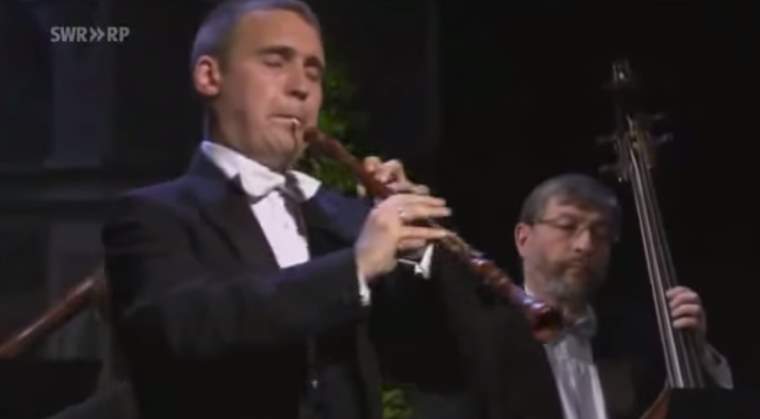An ensemble specializing in music of the eighteenth and nineteenth centuries, the Concerto Köln performs Antonio Vivaldi’s Concerto for Strings in G minor, RV 156. This performance was recorded on March 25, 2022, at the Concertgebouw in Amsterdam.
Vivaldi’s Concerto for Strings in G minor, RV 156
Antonio Vivaldi’s “Concerto for Strings in G minor, RV 156” is a captivating piece of Baroque music that showcases the composer’s mastery of the concerto form. This concerto, like many of Vivaldi’s works, is known for its vivid and expressive qualities.
- Allegro: The concerto opens with a lively and brisk movement, marked by its distinctive rhythm and intricate interplay between the strings. Vivaldi’s use of contrasting dynamics creates a sense of drama and tension, with the strings engaging in spirited dialogues.
- Adagio: In the second movement, Vivaldi shifts to a slower tempo, allowing for a more contemplative and lyrical atmosphere. The strings weave delicate melodies, creating a sense of melancholy and introspection.
- Allegro: The final movement returns to a faster tempo, bringing the concerto to a spirited conclusion. Vivaldi employs his signature virtuosic writing for strings, with rapid runs and dynamic contrasts that showcase the technical prowess of the performers.
This concerto, like many of Vivaldi’s compositions, embodies the spirit of the Baroque era with its distinctive use of contrasting elements, virtuosic performance demands, and emotional depth. It’s a testament to Vivaldi’s enduring influence on classical music.
Antonio Vivaldi
Antonio Vivaldi was born in 1678 as the eldest of nine children in a family in which his father earned a living as a violinist. Vivaldi was baptized on the day of his birth. His poor health, Vivaldi probably suffers from asthma, is the reason for this quick ceremony. It is thought that the boy will not live long, but in the end, he will grow up. Vivaldi received his musical training from his father, but a career as a violinist was initially not for him, because in 1703 he was ordained as a priest. Because of his red hair, Vivaldi is given the name Il prete rosso, the red priest.
Violin teacher
Vivaldi did not hold the priestly office for long, because soon after his ordination he reported that celebrating Mass was too difficult for him. He cites poor health as the reason. Because Vivaldi made exhausting journeys throughout Europe for the rest of his life, his health may have been a pretext to avoid his religious obligations. The fact is that from now on he has more time to devote to making music and in the same year he was appointed maestro di violino and later as maestro de concerti at the Ospedale della Pietà. Vivaldi teaches the orphan girls who are admitted to this orphanage, which is known for its high-quality musical education.
Opera
During the years that Vivaldi taught at the orphanage, the first publications of his work also appeared: trio sonatas, violin concertos, and religious work. When Vivaldi left Venice for Mantua in 1718, he started composing operas. Although the operas have nothing religious in them, Vivaldi likes to pride himself on his priesthood and uses it to his advantage. This is not always appreciated and one of his operas is banned because it was written by a priest who does not serve mass and about whom rumors are circulating that he is in a relationship with a singer.
Trips abroad
In the years that followed, Vivaldi traveled back and forth between Rome and Venice and made his first trips abroad. Between 1729 and 1733 he probably visited Vienna and Prague and in 1738 he came to Amsterdam, where his music had been published since 1711.
At the end of his life, Vivaldi leaves for Vienna. He arrived there in 1740. The reasons for his journey are not entirely clear. Vivaldi’s success in his homeland has been waning for several years and the composer has probably been offered to come to Vienna to stage some of his operas.
However, due to the death of Charles VI in October of that year, all theaters were closed and the performances did not take place. In the meantime, Vivaldi’s health deteriorated and he died on July 28, 1741. Little was left of the once successful and reasonably wealthy composer and he was buried in a poor grave in Vienna.
Sources
- Concerto for Strings in G minor, RV 156 (Vivaldi, Antonio) on the International Music Score Library Project (IMSLP) website
- Chopin: Scherzo No. 3 [İlyun Bürkev] - September 14, 2024
- César Franck: Violin Sonata [Argerich, Capuçon] - September 8, 2024
- Beethoven: Piano Sonata No. 23 “Appassionata” [Anna Fedorova] - September 7, 2024
